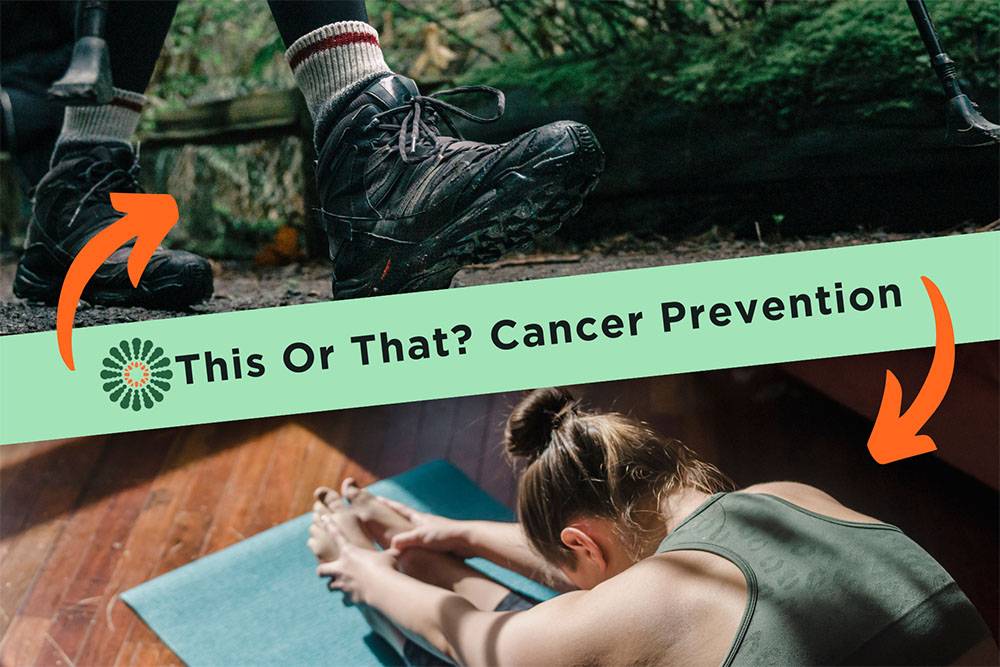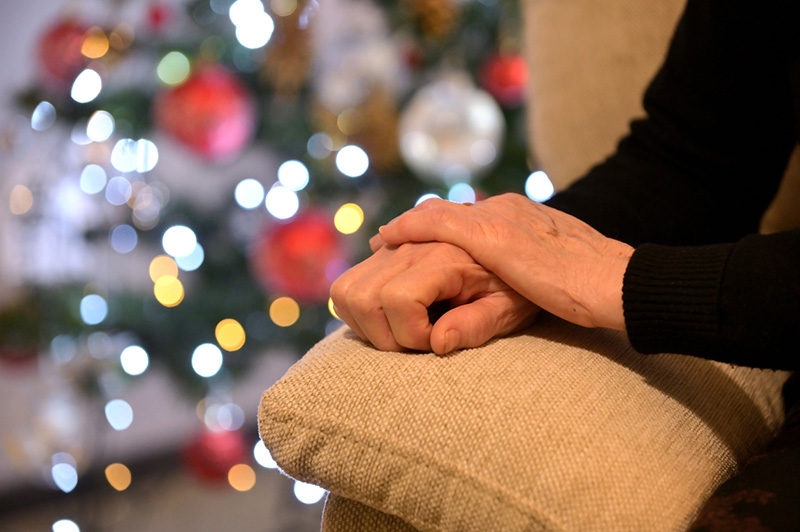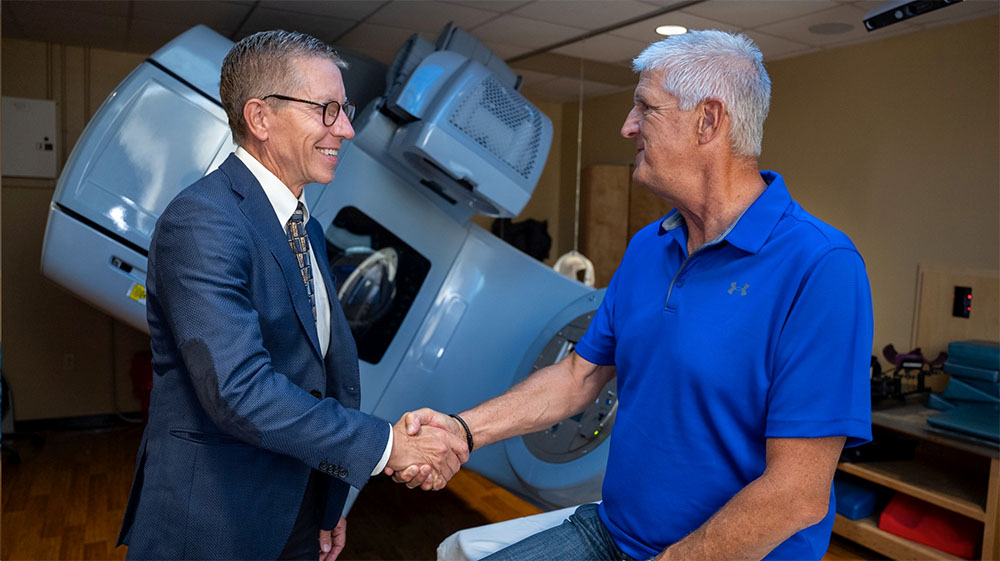Blog

Living as a Colorectal Cancer Survivor: What You Need to Know
For many individuals diagnosed with colorectal cancer, completing treatment is a significant milestone. While it brings relief, it can also bring uncertainty about the future and concern over the possibility of recurrence. Others may find themselves managing cancer as a chronic condition, requiring ongoing treatment. No matter where you are in your journey, survivorship comes with unique challenges—and opportunities to take charge of your health. Creating a Survivorship Care Plan A survivorship care plan is a crucial tool for post-treatment life. Work with your doctor to develop a plan that...

This or That—24 Ways to Reduce Your Cancer Risk
Cancer is a complex disease influenced by genetics, lifestyle, and environment, but research shows that nearly half of all cancer cases can be prevented through healthy choices and risk reduction strategies. While no single action guarantees protection, taking small, meaningful steps can make a big difference. This Cancer Prevention Month, try some of these science-backed recommendations to lower your cancer risk. We’ve made it easy for you by listing 12 ways to reduce your cancer risk and two actionable changes for each that you can make today... just choose this or that. (Bonus: If you...

Coping with Grief and Loss During the Holidays
The holiday season is often portrayed as a time of joy, togetherness, and celebration. Yet for many, it can be a time of complex emotions, especially for those coping with grief and loss. While grief is commonly associated with the death of a loved one, it’s important to recognize that it can stem from many forms of loss—not all of which are tied to someone’s passing. Cancer survivors, for example, may grieve the loss of the life they once had, their physical abilities, or the health they used to enjoy. Families affected by a cancer diagnosis may mourn the way life used to be before illness...

A New Treatment for Advanced Cancer: Bispecific Antibody Therapy
Bispecific antibody therapy is emerging as a promising option for patients with advanced cancer. Lee Pendleton, PharmD, from Arizona Oncology, helps patients and their families better understand how this innovative therapy works, its potential benefits, and what to expect. How Does Bispecific Antibody Therapy Work? Bispecific antibodies either work to stimulate the immune system, deliver a therapeutic payload, bind to a specific cell receptor, and, in some cases, a combination of all three. Antibodies are shaped like the letter “Y,” and scientists have learned how to manipulate them so that...

September is Leukemia and Lymphoma Awareness Month: Debunking Common Myths
September is Leukemia and Lymphoma Awareness Month, providing us with a perfect opportunity to dispel myths about these often misunderstood blood cancers. Below are some of the most common misconceptions: 1. Myth: Leukemia and Lymphomas Aren't Cancer Fact: Both leukemia and lymphoma are types of cancer. While many people think of cancer in terms of solid tumors, leukemia and lymphomas are considered blood cancers. They affect the production and function of blood cells, which are essential for overall health. Leukemia starts in the bone marrow, where blood cells are produced. The disease...

Preventing Cancer in 2024
August is Wellness Month and an excellent opportunity to talk about how crucial a healthy lifestyle is to cancer prevention. Up to 90 to 95 percent of cancers have their roots in environment and lifestyle, while only 5 to 10 percent have a genetic component, according to medical oncologists at Arizona Oncology. Additionally, the World Health Organization (WHO) states that between 30% to 50% of all cancer cases are preventable. When you make choices that prioritize your health and wellness, you are taking actionable steps against developing cancer. While not all cancer risk factors are...

Dr. Mack Talks Prostate Cancer for Men’s Health Month
About 1 in 8 men will be diagnosed with prostate cancer during their lifetime, usually after age 65. This common cancer often grows slowly and may not cause significant harm in its early stages, but some forms of prostate cancer can be aggressive and spread rapidly to other parts of the body. This Men’s Health Month, Arizona Oncology radiation oncologist Dr. Curtis Mack weighs in on what you need to know about prostate cancer. Starting the Journey Have you or a loved one been newly diagnosed with prostate cancer? Prostate cancer management can follow many paths. It can be difficult to know...

What to Eat After Cancer Treatment
After completing cancer treatment, you may want to take steps to help prevent a recurrence. While you cannot control every risk factor, one thing you can control is what you eat. Nutrition plays a role in about one third of all cancers. After smoking, obesity is the most significant controllable risk factor. By maintaining a healthy weight and eating a balanced diet full of healthy, non-processed foods, you can do your part to reduce your risk. In addition to helping prevent recurrence, a healthy, nutritious diet can also help your body recover from cancer treatment. Eating well...

How Does Your Family’s History of Melanoma Affect You?
Is Melanoma Genetic? Melanoma is the most dangerous type of skin cancer. It forms in the cells that produce melanin, which is the substance responsible for your skin's color. Exposure to ultraviolet radiation (UV rays) from the sun or tanning beds increases the risk of developing any skin cancer. In the case of melanoma, experts say there's also a strong link between genetics (your family history) and your risk of developing melanoma. Family History and Genetic Factors If one or more of your parents, siblings or children develop melanoma, you have a higher risk of developing melanoma...

Developments in Prostate Cancer Research
Prostate cancer research has been an ongoing process of looking into causes, prevention, detection, and treatment of prostate cancer. But with hundreds upon hundreds of published studies out there, how can patients keep up with what’s new? Here are some recent developments to watch in prostate cancer treatment: 1. Genetic & Genomic Testing Related to Prostate Cancer Genes can play a role in both the development and behavior of prostate cancer. Two types of tests that can be helpful in acquiring information are genetic testing and genomic testing. While they sound similar, they collect...


